- Home
- Joel C. Rosenberg
Israel at War: Inside the Nuclear Showdown With Iran Page 10
Israel at War: Inside the Nuclear Showdown With Iran Read online
Page 10
If war does come, then we should be ready, not blindsided. Here are some of the steps The Joshua Fund has been taking to prepare for what may be coming. Over the past few years, we have
established twelve humanitarian relief distribution centers throughout Israel
provided humanitarian relief to both Jews and Arabs
purchased trucks and vans for local Jewish and Christian organizations to help them care for the poor and needy
purchased and distributed to the poor and needy approximately forty-five tons of food and relief supplies per month
helped other Christian organizations in Israel purchase and distribute food and relief supplies
equipped The Joshua Fund staff and key allies with satellite phones to be ready to communicate with one another if a war knocks out the cell phone infrastructure
purchased and installed a large generator (and fuel supply) at The Joshua Fund warehouse, and purchased and installed smaller generators (and fuel supplies) for the twelve relief centers to have auxiliary power in case war knocks out the power grid
stockpiled food, water, blankets, and other supplies in case of war or other national emergencies
put our Israeli staff, allies, and volunteers through training in emergency first aid and how to operate in a crisis
equipped our facilities with fully stocked bomb shelters
assisted Christian ministries serving the Palestinians as well as the people of Lebanon, Syria, Jordan, Egypt, Iraq, and even Iran
traveled into many of these countries to pray for peace, encourage the local believers, teach the Word of God, and find other practical ways to love and bless Israel’s neighbors now and in the future, should war erupt
translated my Inside the Revolution documentary film into Farsi and aired it more than forty times on satellite television in Iran. The film explains the latest geopolitical threats and tensions in the Middle East, the Bible prophecies about the future of Israel and Iran, and the stories of Muslims converting to Christianity in record numbers (including in Iran). This special version of the film also closes with Iranian evangelist Hormoz Shariat explaining the gospel in Farsi and giving viewers an opportunity to receive Jesus Christ as their Savior and Lord.
Is this work easy? No. Is what we have done thus far enough? No. But step by step, we’re making progress, caring for poor and needy families—both Jewish and Arab—now, while also getting ready to be a help in times of war and trauma. God is raising up a movement of Christ followers around the world who are committed to loving Israelis because Jesus loves Israelis . . . and loving Palestinians because Jesus loves Palestinians . . . and loving Arabs and Iranians because Jesus loves them, too. This is how the body of Christ is supposed to work—those who have praying, caring, and serving those in need, and doing so in the name of Jesus Christ with unconditional love and unwavering support.
Most Christians have very little geopolitical influence, but we are not powerless. We can pray. We can teach the Word. We can encourage and equip our brothers and sisters in the Middle East. We can show Christ’s love and compassion to all. Jesus commands us: Love your neighbor. Love your enemies. And love one another. This we must do, for if we don’t obey the Lord and shine as a light in the darkness—especially now—who will?
Final Thoughts
The Islamic Republic of Iran declared war on Israel and the United States during the Iranian Revolution of 1979. Its leaders have been hell-bent on killing Jews and Christians ever since, and in recent years they have called outright for the annihilation of both countries.
Now Iran’s leaders—members of an apocalyptic, genocidal death cult who are driven by a murderous Shia Islamic eschatology that calls people to commit genocide in order to hasten the return of the Twelfth Imam—are doing everything in their power to build nuclear weapons and the missiles to deliver them.
The latest intelligence indicates Iran is 70 percent of the way to building the Bomb. By spring 2013, Iran could be 90 percent of the way to having a nuclear arsenal. Soon they will have the means to accomplish their mission.
Make no mistake: Israel is already at war. Its leaders and people are fighting for their very existence.
Thus far, Israeli prime minister Benjamin Netanyahu and his government have been waging a fierce and relentless diplomatic, financial, and covert war to slow down and hopefully stop Iran’s bid for the Bomb. But they haven’t made nearly enough progress, and they know it. Now time is running out. If the dynamic doesn’t change quickly—if the U.S. and other world powers don’t take decisive action to neutralize the Iranian nuclear threat—it is likely that Netanyahu and his top aides will eventually feel compelled to launch an all-out, full-scale preemptive military strike against Iran. It could go well. It could go badly. But the moment of reckoning is nearly here.
For my part, I pray war is not necessary. I hope a revolution takes down the evil regime in Tehran. Or that God supernaturally intervenes. Or that any other scenario develops that neutralizes the Iranian nuclear threat and liberates the suffering, enslaved Iranian people, short of military conflict. But if war is necessary, if there really is no other way, then Israel should not be left to do the hard work alone. The United States and NATO should not shrink from our moral responsibility to prevent a nuclear-armed Iran from taking over the entire Middle East, unleashing thermonuclear attacks on American and European cities, and attempting to cause a second Holocaust of the Jewish people.
Over the past year, I have taken two trips that moved me deeply. In November 2011, I traveled with several pastors to Poland to visit the death camps in Auschwitz. In August 2012, Lynn and I took our sons to visit the USS Arizona memorial at Pearl Harbor. I went to these places to remember what happens when people ignore emerging threats and don’t take decisive action.
To misunderstand the nature and threat of evil is to risk being blindsided by it. Americans didn’t understand the threat posed by Adolf Hitler and the rise of the Nazi regime in Germany in the 1930s, and we were blindsided by the invasion of Europe and the death camps of the Holocaust. We didn’t understand the threat posed by Imperial Japan in 1941, and we were blindsided by the attack on Pearl Harbor. We didn’t understand the threat posed by Osama bin Laden and al Qaeda in 2001, and we were blindsided by the attacks of September 11. We dare not let ourselves be blindsided again.
What’s more, we dare not abandon Israel at this critical hour. In Genesis 12:3, God makes himself clear: those who bless Israel, he will bless; but those who curse Israel, he will curse. President Harry Truman became the first world leader to officially recognize the newly declared modern State of Israel on May 14, 1948. Ever since, the American alliance and friendship with Israel has been strong and noble and enduring, even as we have shown kindness and compassion to Israel’s neighbors, including the Palestinians. As a result, God has blessed America in numerous ways. Now, however, America is stumbling economically, fiscally, morally, culturally, and spiritually. The U.S. is not only facing decline, but we are increasingly at risk of implosion. On top of all our other troubles, challenges, and sins, this is no time for our nation to turn its back on the people of Israel. This is no time to ignore Israel or abandon her or outright turn against her. Doing so could prove the last straw and bring a judgment upon us I shudder to contemplate.
True, the Bible indicates that at some point in the last days—certainly during the prophetic War of Gog and Magog—all the nations of the earth will abandon Israel. The Bible further indicates that eventually—during the prophetic events described in the book of Revelation—all the nations of the earth will actively turn against Israel. The God of Israel will let this happen so he can save Israel physically and spiritually and prove himself the champion and best friend of the Jewish people. But let us not allow America to turn against Israel on our watch. Not here. Not now.
Let us pray for God to give our leaders great wisdom and discernment and the courage to bless Israel and her neighbors. And let us pray for the courage to neutralize Israe
l’s enemies and our own.
What’s more, let us pray for the Lord to pour out his grace and mercy on Israel and her leaders. Indeed, let us pray that the Lord will make Israel’s leaders like the ones described in 1 Chronicles 12:32—“men who understood the times, with knowledge of what Israel should do.”
Sneak Preview of Damascus Countdown
Ever since I first lived in Israel in 1987 and early 1988 as a student at Tel Aviv University, I have wondered what the future of the Jewish State and the modern Middle East would look like. Later, I had the honor of working for a number of Israeli and American leaders who taught me a great deal about the region and its future from their perspective, and I was able to travel extensively through the epicenter as well. In time, I also had the joy of writing two series of novels and three nonfiction books that have explored different geopolitical, economic, and biblical dynamics at work in the Middle East, war-gaming how various scenarios could play out if they were to happen in my lifetime.
One thing has certainly proven true: it is exceedingly difficult to write fiction that keeps up with the drama unfolding at such a rapid pace in the Middle East today.
Several years ago, I set out to write a three-part series of political thrillers looking at three scenarios I thought were chilling and horrible but plausible.
Scenario 1: What if an American president thought he truly understood Islam and the Middle East but seriously miscalculated vis-à-vis Iran? What if he discounted the role of Shia End Times theology in the policies of Iran’s leaders and waited too long to take decisive action to neutralize the Iran threat? What if Iran suddenly crossed the nuclear threshold and built not just one but a small arsenal of nuclear warheads and the missiles to deliver them? What if a false messiah claiming to be the Twelfth Imam actually emerged and began leading the Muslim world in an effort to destroy the U.S. and Israel and build an Islamic kingdom or “Caliphate”? What would an American president do in such a dangerous development? This was the premise of The Twelfth Imam.
Scenario 2: What if, despite the sudden development of an Iranian nuclear arsenal and the launch of a major terrorist attack by Iran on American soil, an American president was more determined to stop Israel from launching a preemptive military strike against Tehran than he was to stop Iran from launching a second Holocaust against Israel? What if such a president applied enormous public, political, diplomatic, and economic pressure on an Israeli prime minister and his government in an effort to prevent Israel from launching a first strike at all costs? How might an Israeli prime minister respond? How would he weigh the pros and cons and make a final decision? How would he see the future of Israel in light of Scripture? Would he order the attack, or would he bow to American pressure? This was the premise of The Tehran Initiative.
Scenario 3: What if an Israeli prime minister launched a massive preemptive military strike on Iran despite the clearly expressed wishes of the American president that he not do so? How might the war unfold? What tools would Israel have in her arsenal? How might Iran and her allies—Hezbollah, Hamas, and particularly Syria—respond? How bad could the blowback to Israel be, and how would Israel handle an unending barrage of missiles on its population centers night and day? What would happen if Israel’s initial attack was only partially successful and several of the Iranian nuclear warheads survived and were moved and were set to be fired at Israel? How would Israel handle such dangers? Might Israel find itself isolated from the entire international community and cut off from American assistance, alone and on its own in a dangerous world for the foreseeable future? Could Israel inadvertently set into motion events that could spin wildly out of control? Could Iran? Could decisions made by leaders with little or no interest in the Bible unintentionally set the stage for the fulfillment of biblical prophecies about the end of days, including the destruction of one of the world’s oldest continuously inhabited cities? This is the premise of the forthcoming novel, Damascus Countdown, the last in the trilogy.
Novels, of course, are safe places to consider such questions. I can set up the geopolitical parameters of the story and then extrapolate what might happen—the good, the bad, and the ugly—without anyone getting hurt. Readers can imagine how various scenarios might unfold without necessarily supporting the choices made by the fictional characters in the novels. World leaders, military officers, and intelligence analysts and operatives can view the stories as they would a war game, considering various outcomes while also challenging the premises and imagining how the stories might change if different decisions were made.
It’s been quite interesting for me over the years to see the wide range of people who read these books. I’ve had current and former officials at the White House, the Pentagon, the CIA, and Homeland Security, plus members of Congress, governors, and presidential candidates contact me to discuss the scenarios and research in these books and to ask me how these possible scenarios should be factored into public policy, if at all. Occasionally foreign leaders are interested as well.
I don’t claim, of course, that the fictional scenarios I lay out in my novels are the way actual geopolitical events or Bible prophecies will play out. These thrillers examine how terrible, traumatic, and even supernatural events could unfold. I hope they keep you riveted and even keep you up late at night talking with family and friends and complete strangers, asking, “What if this stuff were true? What if this stuff happened in our lifetimes? What would it look like? What would it feel like? How would it change my life? How should it?”
That said, here is a sneak preview from my forthcoming thriller, Damascus Countdown, available in bookstores and online March 5, 2013.
1
QOM, IRAN
David knew one of Iran’s largest nuclear facilities—the uranium enrichment plant at Fordow—was just a few miles away over the ridge, and sure enough, a split second later, he heard the deafening roar of explosions, one after another in rapid succession. He turned and saw enormous balls of fire and plumes of smoke rising into the sky and the four Israeli jets disappearing into the clouds.
But then another strike package came swooping down behind them. Four more Israeli fighters—emblazoned with the blue Star of David on their wings—descended like lightning. He assumed their mission, too, was to attack the facility down the road. But David watched in horror as one of the jets first fired an air-to-ground missile at the heart of the mosque behind him. They were sending a message to the Twelfth Imam and to all his followers. But they were about to destroy David’s plan.
His instinct was to get up and run for cover, but it was too late, and he had to do everything possible to protect Javad Nouri. That was his mission. Under no circumstances could he allow Nouri to die. He absolutely had to deliver the aide back to the Mahdi wounded but alive and indebted to David. It was, he believed, the only chance to gain the Mahdi’s trust and the only shred of a chance he had to be invited into the inner circle. Then again, did any of that matter now? The war he had been sent to prevent was under way. The carnage on both sides was going to be incalculable. The entire region was about to go up in flames. What was left for him to do?
Suddenly the ground convulsed as a series of explosions ripped through the complex. The minarets began to totter. People were screaming again, running in all directions as the first tower came crashing down, and the second followed. David covered his head and made sure Nouri was covered too. Then, as the smoke began to clear, he turned and surveyed the carnage. Bodies were sprawled everywhere. Some were dead. Others were severely wounded. David turned Nouri over. He was covered in blood. His eyes were dilated, but he was breathing. He was still alive.
Guns drawn, three injured bodyguards soon rushed to David’s side. With his help, they carefully picked up Nouri and carried him to the white SUV, severely damaged by the car bombing nearby but still intact and still running. Together, they laid Nouri down on the backseat. One security man climbed in the back with him. Another climbed into one of the middle seats. The third shut and locked the
side door, then got in the front passenger seat.
“Wait, wait; you forgot these,” David yelled just before the guard closed the door. He grabbed the box of satellite phones and gave them to the guard. “The Mahdi wanted these. They don’t all work. But some of them do.”
Then he pulled out a pen and quickly wrote his mobile number on the box. “Have the Mahdi’s people call me and tell me how Javad is. And tell me if there’s anything I can do for the Mahdi himself.”
The guard thanked David and shook his hand vigorously. Then he shut the door, and what was left of the motorcade raced off.
David stood there alone as the ground shook again. More Israeli jets were swooping down from the heavens. They were firing more missiles and dropping more bombs on targets just over the mountains. For a moment, David couldn’t move. He stared at the billows of smoke rising from the air strikes over the horizon and tried to calculate his next move.
He looked to the street, searching for the taxi he’d asked to wait. It was nowhere to be seen, but he could hardly blame the driver. People were panicked from the gunfire, the car bombing, and the air strikes. They were fleeing as rapidly as they could in every direction. David knew he had to get away as well. He couldn’t afford to be caught by the police and dragged in for questioning. He had a mission. He had a plan. He had a team that was counting on him. He knew he had to stay focused, yet he grieved for those wounded around him. So he turned and rushed to the side of one severely wounded guard who was slipping into unconsciousness. Hearing sirens approaching from every direction, David took off his jacket and used it to put pressure on the man’s bleeding leg. As he did, he silently prayed over the man, asking the Lord to comfort and heal him.

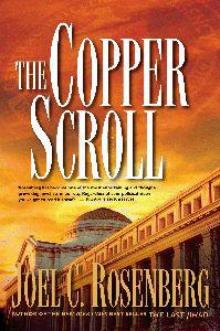 The Copper Scroll
The Copper Scroll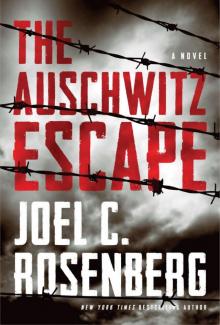 The Auschwitz Escape
The Auschwitz Escape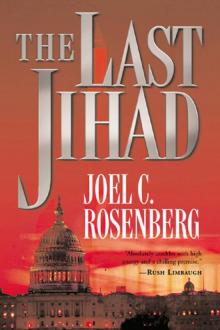 The Last Jihad
The Last Jihad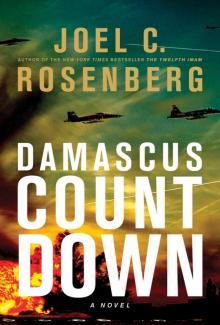 Damascus Countdown
Damascus Countdown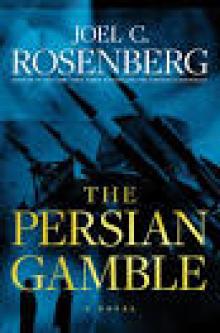 The Persian Gamble
The Persian Gamble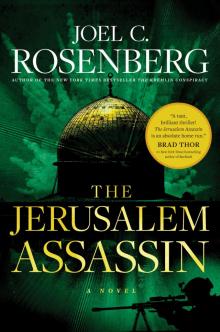 The Jerusalem Assassin
The Jerusalem Assassin Dead Heat
Dead Heat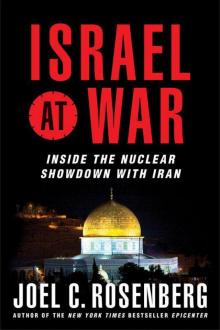 Israel at War: Inside the Nuclear Showdown With Iran
Israel at War: Inside the Nuclear Showdown With Iran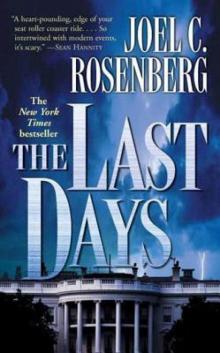 The Last Days
The Last Days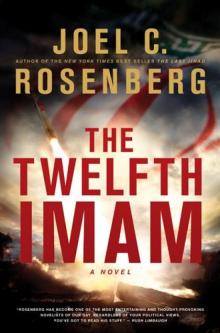 The Twelfth Imam
The Twelfth Imam Epicenter 2.0
Epicenter 2.0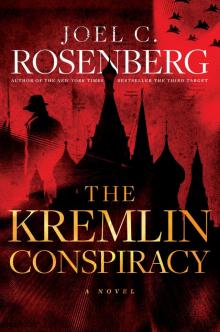 The Kremlin Conspiracy
The Kremlin Conspiracy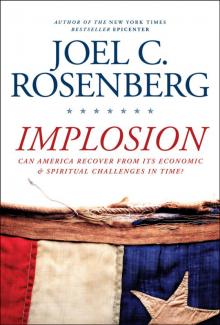 Implosion: Can America Recover From Its Economic and Spiritual Challenges in Time?
Implosion: Can America Recover From Its Economic and Spiritual Challenges in Time?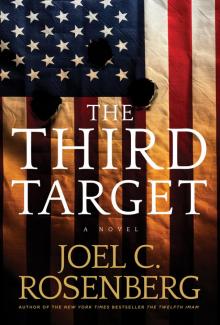 The Third Target: A J. B. Collins Novel
The Third Target: A J. B. Collins Novel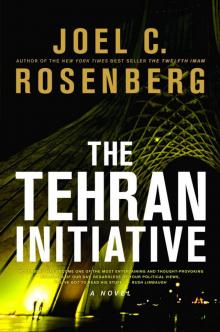 The Tehran Initiative
The Tehran Initiative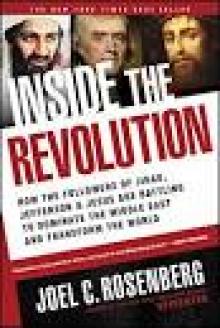 Inside the Revolution
Inside the Revolution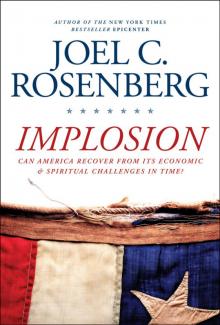 Implosion
Implosion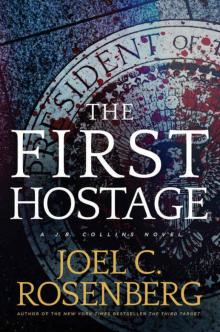 The First Hostage: A J. B. Collins Novel
The First Hostage: A J. B. Collins Novel